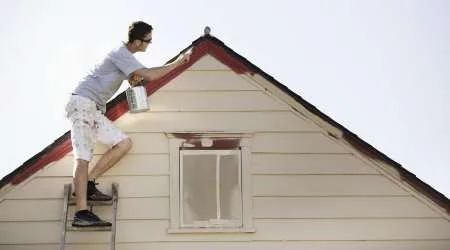
First homebuyer e-course
Sign up for our FREE 8-week course to get on the property ladder.
Scan to download the Finder app on iOS or Android
We’re reader-supported and may be paid when you visit links to partner sites. We don’t compare all products in the market, but we’re working on it!
We update our data regularly, but information can change between updates. Confirm details with the provider you're interested in before making a decision.
Most home loans are available for first-time buyers and existing borrowers who want to refinance or buy a second home. There aren't many loans that are only offered to first home buyers.
All the loans in the table above are owner-occupier loans, meaning they're for homebuyers and not investors. We've included a mix of fixed and variable rate home loans with competitive interest rates. Many loans are available with deposits smaller than 20%. To find these loans, look at the Max LVR (loan to value ratio) column in the table. If the maximum LVR is 90% or higher, then it's available with a 10% deposit or smaller.
*The loans in the table above may also be available for non-first home buyers. But first home buyers may find these loans useful because many have low interest rates or max insured LVRs above 80%, meaning you can get them with a smaller deposit.
First home buyers, like all other borrowers, are in the market for a home loan that suits their needs and has a low interest rate, so they're not paying more than they need to.
Here's how to find the best loan for you:
Before you can get your first home loan or even try to buy a home you need to know how much it will all cost you. Your deposit is usually the biggest cost, and the size of your deposit affects which home loans you can get (we'll cover deposit saving in the next section).
But there are many other costs to consider beyond the deposit:
You can use a borrowing power calculator to get a clear idea of how much a bank will lend you.
You will need to enter your income (and your partner's income if making a joint application), plus the number of dependents and any debts you have. The calculator will then estimate your expenses using a standard cost of living index. The end result will only be an estimate but it gives you a better idea of how much you can borrow.
You can also check out our guide on how to increase your maximum borrowing capacity.
Once you have a good understanding of your property buying costs and how much you can borrow, it's time to think about the deposit.
Loan to value ratio (LVR) is a fancy mortgage term for your deposit size in relation to your property's value. If you bought a $500,000 property with a $100,000 deposit, that would be a 20% deposit, or 80% LVR. Having a 20% deposit means you can avoid paying lenders mortgage insurance.
Max Phelps, founder of Golden Eggs and creator of the FIVE 2 Money Diet, says first home buyers also need to prepare themselves for the financial responsibilities that come with owning a home, which goes much further than just saving the deposit.
"How good are you at managing your expenses and building up savings? If you've gotten into bad spending habits and money feels a little out of control, imagine how much worse it would feel with a giant mortgage hanging over your head," Phelps says.
"People spend an average 30% of their income on a mortgage, but to get ahead, you should plan to still save 20% of your income as well – this will set you apart in the long run."
For those who are considering asking their parents for help with a home loan deposit, Phelps is cautious.
"My advice to parents thinking about putting their property on the line for their kids would be to make sure the kids are good savers first," he says.
"We find that having a few bank accounts spread across at least two banks dramatically increases savings and improves confidence in buying a first home."
If your deposit is smaller than 20% of the property's value (so, your LVR is 81% or higher), your lender will charge you lenders mortgage insurance. This can cost you thousands or tens of thousands on top of all your other expenses (although you can often borrow it alongside your loan amount).
LMI costs vary depending on your loan amount and deposit size. If your LVR is 85% (a 15% deposit) then your LMI will be less than if you have an LVR of 95%.
Here are some examples.
| Property price | Deposit | LMI |
|---|---|---|
| $500,000 | 10% ($50,000) | $8,679 |
| $500,000 | 5% ($25,000) | $14,871 |
| $700,000 | 10% ($70,000) | $15,498 |
| $700,000 | 5% ($35,000) | $27,946 |
| $900,000 | 10% ($90,000) | $19,926 |
| $900,000 | 5% ($45,000) | $35,931 |
The LMI amounts above are taken from Genworth's LMI premium estimate calculator and are examples only.
Saving a deposit for your first home is tough, especially if you're renting. And when house prices rise the amount you need to save only grows. Finding a low deposit home loan can make the task easier. But there are a few other ways to build your deposit:
First home buyers in Australia have access to a large and sometimes confusing range of state and federal grants, concessions and other schemes.
Eligibility for these programs depends on factors like your property value and whether it's newly built or already exists. Every state and territory has different rules and policies.
Here is a list of the various first home buyer grants and concessions:
Some first-time buyers are eligible for a cash grant. These grants can run up to $10,000 or even more in some cases. To qualify you often need to be purchasing a new or off-the-plan property, with a limit on the overall value of the property.
These grants differ in every state and territory.
Check your eligibility with our state-by-state first home owner guide
Stamp duty is one of the biggest costs associated with buying a property. Luckily, many first-time buyers can avoid stamp duty completely or get a discount on this tax. In NSW, for example, first home buyers don't have to pay stamp duty on properties valued below $650,000, saving them up to $22,000.
Learn more about the stamp duty exemptions and concessions in each state and territory.
If you only have a 5% deposit saved and you're a first home buyer, you could be eligible for the First Home Loan Deposit Scheme. Under this scheme eligible borrowers can borrow 95% of their property value with a 5% deposit and have the government guarantee the remaining 15% of the deposit, allowing them to avoid LMI costs.
This is a federal government scheme.
Another federal scheme, the First Home Super Saver Scheme allows first home buyers to make extra payments into their superannuation and then withdraw them to use for a home deposit. This ends up saving you in tax while helping you build your deposit.
Up to 10,000 single parents (2,500 per year for four years) are eligible to buy a home with a deposit of just 2%, under the government's Family Home Guarantee, announced as part of the 2021 Federal Budget in May. This means for the purchase of a property worth $700,000, the homebuyer will need to save a deposit of just $14,000.
As part of the Victorian state budget update in November 2020, it was announced that all homebuyers, including first timers, now have access to a stamp duty discount of up to 50% of the purchase price of residential property in Victoria.
For those purchasing property in Victoria, a full 50% stamp duty discount will apply to all buyers of newly built homes valued at up to $1 million. For those buying existing homes, a 25% stamp duty discount will apply on properties priced up to $1 million.
This discount on stamp duty in Victoria was available for those who entered a purchase contract between 25 November 2020 and 30 June 2021. Importantly for first home buyers, this discount applied in addition to any other waivers or concessions that you may be eligible for. This discount was only valid on contracts that were signed prior to 1 July 2021.
You don't have to find your first home loan all by yourself. Mortgage brokers are experts who have access to home loans from a panel of lenders. They can suggest suitable options for you and help you with the whole application process. Their services are usually free. While most people are perfectly capable of getting their own home loan, a broker can be a useful guide.
Richard Whitten is a senior writer at Finder, and has been covering home loans and the property market in Australia for the last 4 years. He has written for Yahoo Finance, Money Magazine and Homely, as well as multiple banks and lenders. Richard has a Certificate IV in Finance and Mortgage Broking, a Bachelor of Education from the University of Sydney and a Graduate Certificate in Communication. He enjoys helping people understand the ins and outs of mortgages so they can make smarter property decisions. Richard trained as a high school teacher but found it easier to manage personal finances than a classroom full of kids. Before joining Finder, he edited textbooks and taught English in South Korea.
Finder's First Home Buyers Report 2021 explores the state of the first home buyer market.
The HomeBuilder scheme explained. Learn how Australians who are building or renovating their homes can receive a $25,000 grant.
The First Home Loan Deposit Scheme will let new buyers borrow 95% and avoid paying thousands in lenders mortgage insurance premiums.
Planning on buying your first home? Tips from the experts can help first home buyers save a deposit and get into your own home sooner than you think.
The First Home Super Saver Scheme explained.
If you’re a first home buyer in NSW, find out what government grants and concessions may be available to you if you’re an eligible purchaser.

Sign up for our FREE 8-week course to get on the property ladder.

Get a cash lump sum of $2,000+ for refinancing to a low-rate loan.

Pay less for your home loan with a super-low interest rate.

Save on your investment loan with these hot offers.
Our goal is to create the best possible product, and your thoughts, ideas and suggestions play a major role in helping us identify opportunities to improve.
finder.com.au is one of Australia's leading comparison websites. We compare from a wide set of banks, insurers and product issuers. We value our editorial independence and follow editorial guidelines.
finder.com.au has access to track details from the product issuers listed on our sites. Although we provide information on the products offered by a wide range of issuers, we don't cover every available product or service.
Please note that the information published on our site should not be construed as personal advice and does not consider your personal needs and circumstances. While our site will provide you with factual information and general advice to help you make better decisions, it isn't a substitute for professional advice. You should consider whether the products or services featured on our site are appropriate for your needs. If you're unsure about anything, seek professional advice before you apply for any product or commit to any plan.
Products marked as 'Promoted' or 'Advertisement' are prominently displayed either as a result of a commercial advertising arrangement or to highlight a particular product, provider or feature. Finder may receive remuneration from the Provider if you click on the related link, purchase or enquire about the product. Finder's decision to show a 'promoted' product is neither a recommendation that the product is appropriate for you nor an indication that the product is the best in its category. We encourage you to use the tools and information we provide to compare your options.
Where our site links to particular products or displays 'Go to site' buttons, we may receive a commission, referral fee or payment when you click on those buttons or apply for a product. You can learn more about how we make money here.
When products are grouped in a table or list, the order in which they are initially sorted may be influenced by a range of factors including price, fees and discounts; commercial partnerships; product features; and brand popularity. We provide tools so you can sort and filter these lists to highlight features that matter to you.
We try to take an open and transparent approach and provide a broad-based comparison service. However, you should be aware that while we are an independently owned service, our comparison service does not include all providers or all products available in the market.
Some product issuers may provide products or offer services through multiple brands, associated companies or different labelling arrangements. This can make it difficult for consumers to compare alternatives or identify the companies behind the products. However, we aim to provide information to enable consumers to understand these issues.
Providing or obtaining an estimated insurance quote through us does not guarantee you can get the insurance. Acceptance by insurance companies is based on things like occupation, health and lifestyle. By providing you with the ability to apply for a credit card or loan, we are not guaranteeing that your application will be approved. Your application for credit products is subject to the Provider's terms and conditions as well as their application and lending criteria.
Please read our website terms of use and privacy policy for more information about our services and our approach to privacy.
Hi team,
My fiance and I are looking to go into partnership to buy a property with a family friend. The family friend has good borrowing capacity and will be getting a loan to buy the property, so the title will be in his name, but we are wondering if it is possible to enter into a vendor finance agreement with our family friend to buy a portion of the property while he is still paying off the loan to the bank?
Ideally, we would like to buy a portion of the property and also be on the title without having to subdivide. Is this possible?
We are also wondering if my fiance and I will qualify for the First Home Owners grant and the exception for stamp duty if we go into a vendor finance agreement? We do intend to build our first home.
Thank you!
Hi Bri,
Thanks for reaching out to Finder.
With regard to the option of entering into a vendor finance agreement, it would help you buy a property without having to apply for a bank loan, but there are some major risks involved, including the big risk of losing your home.
The same fees and taxes are payable with vendor finance as they would be with a standard home loan. So the amount of stamp duty payable will vary depending on which state you live in and the value of the property.
To sum it up, if you’re thinking of purchasing a property through vendor finance, you should seek a solicitor to run you through the process and legal considerations so that you may be guided accordingly.
Cheers,
Joanne
Hi, I was wondering if I buy an investment property, whether or not i can claim the fist
home buyers on my second home that I will live in? I live in Victoria.
Hi Joel!
Thanks for the comment.
These are the guidelines for those who wish to claim FHOG on an investment property in Victoria:
Victoria’s State Revenue Office is responsible for offering the $10,000 grant to applicants buying or building their first new home. To be eligible for the grant, you must not have:
– Received a First Home Owner Grant in Australia
– Owned a home in Australia, either jointly or separately, prior to 1 July 2000
– Occupied an Australian home in which either of you acquired a relevant interest on or after 1 July 2000 for at least six continuous months
So if you purchased your investment property on or after 1 July 2000 and you didn’t live in it for a period of six consecutive months, you may be eligible for the FHOG.
You may check the other eligibility criteria for more information.
Alternatively, you may also contact your local state revenue office for clarification.
Hope this helps.
Cheers,
Jonathan
What is the best search engine in the world?
Hi Kathey,
Thank you for your inquiry.
Unfortunately, we cannot recommend what is best for you. Our company finder.com.au is a financial comparison website and general information service designed to help consumers to make a better decision. Please note we do not represent any company we feature on our pages.
However, at the time of this writing, there are three major search engines on the web today. That would be Google, Yahoo, and Bing. I would recommend you check each of them and see which would best meet your needs and preference.
Regards,
Harold
As a first home buyer, can I buy an investment property, and then when time is right buy a personal living home and qualify for the first buyers home loan on this property?
Hi Glenda,
thanks for the question.
The exact requirements and eligibility will depend on what state you’re buying in. Some states do not allow this, such as NSW and QLD, but others, such as WA, TAS, SA, NT and ACT allow this in some circumstances.
I hope this helps,
Marc.
Hi, I’m on single parenting payment and I was wondering if it was possible to get a home loan of some sort? I’ve read about something about FTB. My daughter is one and I am looking for a job.
Hi Jess,
Thank you for your inquiry.
You may want to see more information on first home owners grants and how this works and a dedicated page for single parent home loans while receiving Centrelink payments.
I recommend getting in touch with a licensed mortgage broker. A broker can help you understand your financial position and they can leverage their panel of networks to find a lender that’s more inclined to review your application.
Before applying, please ensure that you meet all the eligibility criteria and read through the details of the needed requirements as well as the relevant Product Disclosure Statements/Terms and Conditions when comparing your options before making a decision on whether it is right for you.
I hope these pages assist you and show that there are avenues for you to receive a home loan.
Regards
Jodie